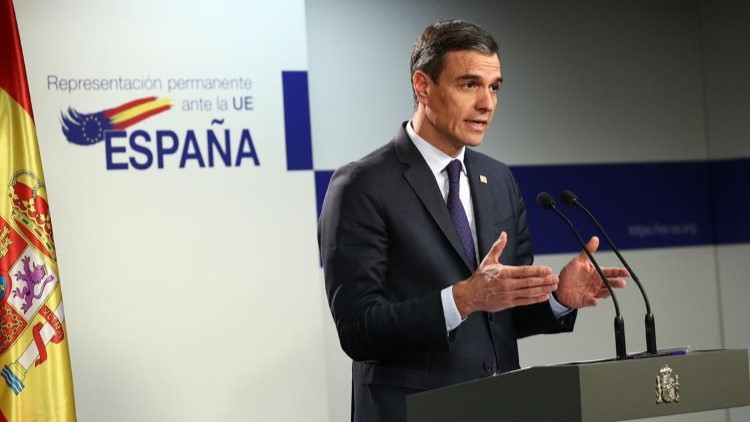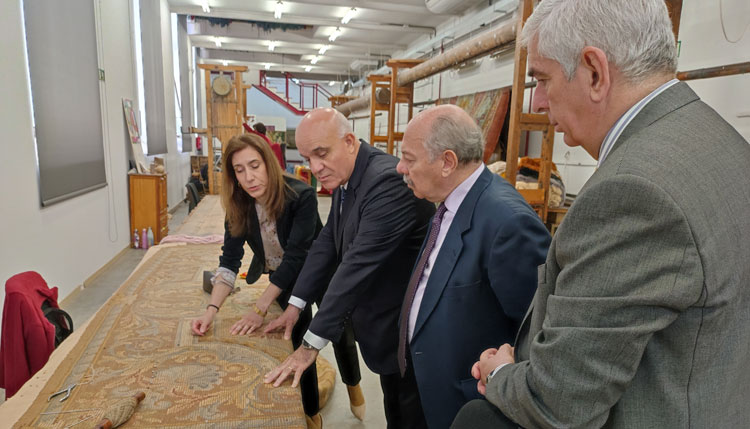Eduardo González
The President of the Government, Pedro Sánchez, assured yesterday in Brussels, at the end of the European Council, that he had spoken with some of his EU colleagues about his next trip to China and specified, in this regard, that the proposal presented by Beijing on the conflict in Ukraine “is not a peace plan” as such, but it has “some points of interest”, such as the rejection of nuclear weapons and the respect for the territorial integrity of Ukraine.
Sánchez made these statements at the press conference following the European Council, held on Thursday and Friday in Brussels, which included, as the main item on the agenda, the analysis of the latest developments in relation to Russia’s war of aggression against Ukraine and the EU’s continued support for this country.
The Council, which was addressed by videoconference by the President of Ukraine, Volodymir Zelensky, reiterated “its strong condemnation of Russia’s actions and its unwavering support for Ukraine and its people” and called for “the immediate, complete and unconditional cessation of Russia’s aggression and full respect for international humanitarian law”. It also took note of the arrest warrants issued by the International Criminal Court against Russian President Vladimir Putin for war crimes, while welcoming “with satisfaction” the agreement to create in The Hague the new International Center for the Prosecution of the Crime of Aggression against Ukraine.
Apart from that, EU leaders pledged to “maintain and increase collective pressure on Russia through possible new restrictive measures” and stressed “the importance of ensuring effective implementation of restrictive measures and preventing and combating their circumvention.” The European Council also welcomed “the agreement reached in the Council to provide Ukraine with one million complete ammunition units within one year”.
In this regard, Pedro Sanchez stated that Europe must “continue to talk with the rest of the international community about the possibilities for resolving the war, including such important global players as China.” “We are at a transcendental moment and, as you know, next week I will travel to the capital Beijing on an official trip” at the invitation of the Chinese President, Xi Jinping, he recalled. This visit, he continued, is of the “utmost importance” because it will help to “reaffirm our bilateral relations on the occasion of the 50th anniversary of the establishment of diplomatic relations” and because “it is important for Europe to strengthen cooperation between Europe and China in the face of global challenges that transcend borders”.
“And finally, this brutal war of Putin’s in Ukraine will also be the subject of debate,” he added. Spain supports “the peace plan proposed by President Zelenski” because “it is the plan that can guarantee a lasting and just peace, which is what Ukraine needs, and I believe it is what Europe and the world needs,” Sanchez recalled. However, he added, “on the occasion of my visit to Beijing, we will logically also take the opportunity to know in more detail the position of the Chinese government on the war in Ukraine, without forgetting that any solution must logically have the support of Ukraine and respect the United Nations Charter”.
“It is important to know the points of the plan directly from Xi Jinping”
Regarding the six-point plan proposed by China to end the war, Pedro Sanchez – the first Western leader to meet with Xi after the latter’s recent visit to Moscow to meet with Russian President Vladimir Putin – admitted that “there is no peace plan, because it is not a peace plan that China has proposed.” “What China has proposed is a positioning document, of what it considers necessary for peace to be achieved, and there are some points that I think are of interest,” he continued. “Of course, a fundamental one is that China rejects with all the arguments that nuclear weapons can be used. I think this is very important,” he stressed. “Secondly, it calls for respect for territorial integrity. And that obviously speaks of respect for the UN Charter, at least that’s how I interpret it,” he added.
“In any case, I think it is important to know firsthand what are the meanings behind these points directly from President Xi Jinping”, because “China is a global player and, obviously, its voice must be heard to see if together we can put an end to this war and Ukraine can regain, finally, its territorial integrity, that which was violated by Putin on February 24 last year,” he said.
Asked whether he had discussed this issue with any European colleague during the Brussels Council, Pedro Sánchez replied, without further details: “Yes, I have spoken with colleagues from the European Council, as it cannot be otherwise”.
Last Monday, the EU High Representative, Josep Borrell, declared, regarding China’s six-point plan, that “a very great intellectual effort is needed to consider it a peace plan” because, among other defects, it has not been consulted with the two parties in conflict and places “the aggressor and the attacked” on the same level. For his part, NATO Secretary General Jens Stoltenberg believes that “it does not have much credibility because it has not condemned the illegal invasion”.







